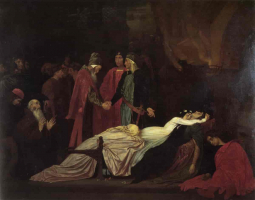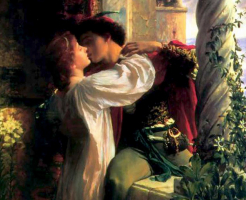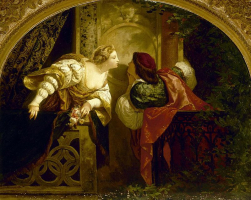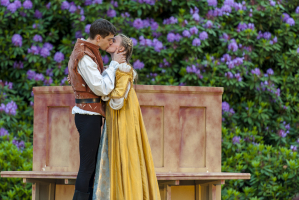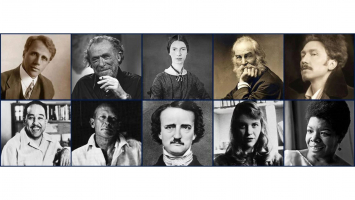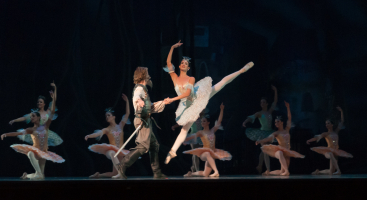Top 7 Most Famous Quotations From Romeo And Juliet With Explanation
Romeo and Juliet are one of the most well-known dramas ever written in English. It portrays the narrative of two young lovers whose families have a long ... read more...history of violence against one other, and it was written by the renowned writer William Shakespeare. Romeo and Juliet, like other Shakespeare plays, is full of fantastic language. The following are ten of the most famous quotations from Romeo And Juliet with explanation.
-
Coming at number one on that list of the most famous quotations from Romeo And Juliet is “O, she doth teach the torches to burn bright.” First, consider Romeo's comments in context: he is with his buddy Mercutio at the Capulets' masked ball. Mercutio has just informed Romeo about Queen Mab, a fairy who enters young men's dreams and makes them dream of love and passion. Romeo sees Juliet at the masked ball and falls in love with her right away; she, too, falls for him. Romeo's initial reaction to clapping eyes on Juliet is, “O, she doth teach the torches to burn bright.”
When Romeo first discovers Juliet dancing with a knight, he says these lyrics in appreciation of her. It's worth pausing to consider this image. "O, she doth teach the torches to burn bright": the torches don't appear to be all that light when compared to Juliet's beauty's brilliance and radiance. Teach here has the same connotation as teaching someone a lesson or schooling someone: it has a competitive ring to it. Romeo is implying that Juliet might teach the (poor, dim) torches a thing or two about how to glow brightly.
Romeo - Act 1, Scene 5.
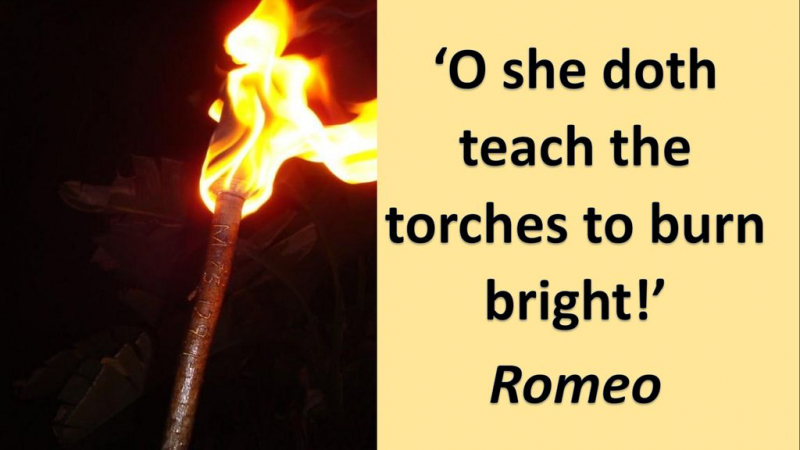
www.pinterest.com Lightbulb Revision-youtube.com -
Romeo believes Juliet is dead and is standing by her grave when Paris comes across him, accusing him of her death and challenging him. He's despondent, despairing, and enraged. He's come to view Juliet's body and commit suicide so that he can be with her in death.
Paris attempts to "apprehend" Romeo, who has been exiled from Verona for assassinating Paris. Paris informs Romeo that he "must die," and Romeo replies, "I must truly," meaning that he intends to die tonight in some way. He then warns Paris not to "tempt not a desperate man" implying that he should not tempt him to fight since a desperate man is a deadly opponent.
The fact that Romeo no longer wants to live proves that he is "desperate." Juliet was "the sun" in his life, as he explains early in the play. There is no longer any warmth or light in the world without her. As a result, he believes he has no purpose to live. He wants to die, but he also wants to see Juliet one more time. He assassinates Paris for this reason. After hugging Juliet's body, he consumes poison and surrenders his life to the "dashing rocks" of death.
Romeo - Act 50, Scene 3.

www.pinterest.com Quotable Ts-youtube.com -
These comments are spoken by Juliet after a lengthy sequence in which they proclaim their love but must now part ways. Juliet says, "Good Night, Good night! Parting is such sweet sorrow, that I shall say good night till it be morrow” which is regarded as one of the play's most famous lines. Simply put, parting between lovers is both sweet and painful because of the time spent together.
Romeo and Juliet, as lovers, are eagerly anticipating their reunion. Juliet makes her goodbyes to her boyfriend, Romeo, at this moment, expecting another reunion the next day. This is Juliet's way of saying goodnight to Romeo, her boyfriend. This sad separation brings them joy and appears "sweet" since it gives them hope of seeing one other the next morning. She mentions the agony they've been through since their relationship began. The same is true for Juliet, since saying farewell to Romeo brings up strong feelings in her; yet, melancholy reminds her of their profound love, therefore it is sweet. She wants to say goodbye to him again and over till daylight. Simply said, couples despise being separated from one another when they are really in love.
Juliet - Act 2, Scene 2.
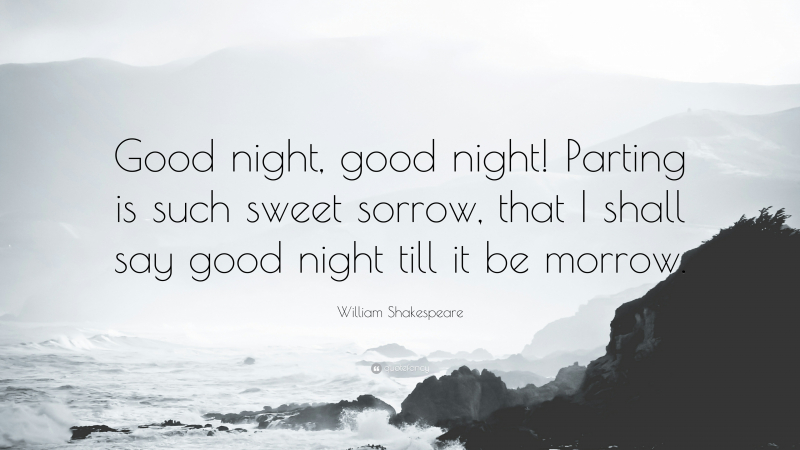
www.pinterest.com The Zeroth Folio of Shakespeare-youtube.com -
Juliet says in one of Shakespeare's most famous quotations from Romeo And Juliet: “What’s in a name? That which we call a rose by any other name would smell as sweet”. Because Romeo is a Montague, Juliet is forbidden to socialize with him. It would be OK if he went under another name. She complains that his name has no meaning for her. The rose would still be the same if it had a different name. So, even if Romeo had a different name, he would still be the same lovely young guy. "What's in a name?" says the narrator. "That which we call a rose by any other name would smell as sweet" Juliet understands that she is unable to love a Montague due to the blood rivalry. She thinks about it. The only thing that is against you is your name.
Even if you are a Montague, you are who you are. What exactly is a 'Montague'? It's not a man's hand, foot, arm, face, or any other body part. Oh, how I wish you were known by a different moniker. What makes a name so unique? Even if it was called something else, a rose would smell as wonderful. So, even if Romeo wasn't named Romeo, he would still be great. Take off your name and have all of me in return for that complete name, which isn't a part of who you are.
Juliet - Act II, Scene 2.
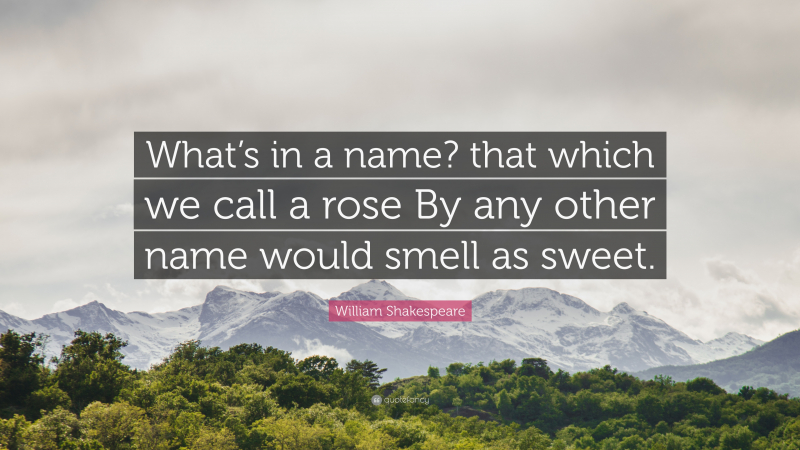
www.pinterest.com bsbniac-youtube.com -
If you've never read Romeo & Juliet, you could think of one of the most famous quotations from Romeo And Juliet: “One fairer than my love? The all-seeing sun Ne’er saw her match since first the world begun” Romeo is referring to is Juliet. In this phrase, Romeo is speaking to his cousin Benvolio about his love for Rosaline. Romeo's answer to Benvolio's attempt to persuade him. It would be sacrilegious for Romeo to begin adoring someone other than Rosaline. He also believes that there is no way he could think of another lady who is more gorgeous than Rosaline. When Romeo asks Benvolio, "One fairer than my love?" he does it in a skeptical tone, implying that he does not believe Benvolio's proposal is true.
Romeo can't imagine he could ever think of someone more gorgeous than Rosaline. Romeo compares Rosaline to the sun in his following line, "The all-seeing sun Ne'er saw her match since first the world began". He calls the sun "all-seeing" since it dwells in the sky, gazing down on the entire planet and seeing everything. He goes on to remark that nothing is more beautiful than the sun, and Rosaline is as lovely as the sun, thus no one is more beautiful than she is. Ironically, when he sees Juliet, that's precisely what occurs.
Romeo - Act 1, Scene 2.
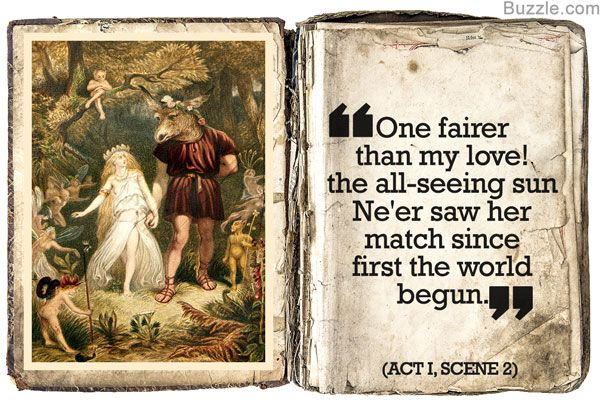
www.pinterest.com 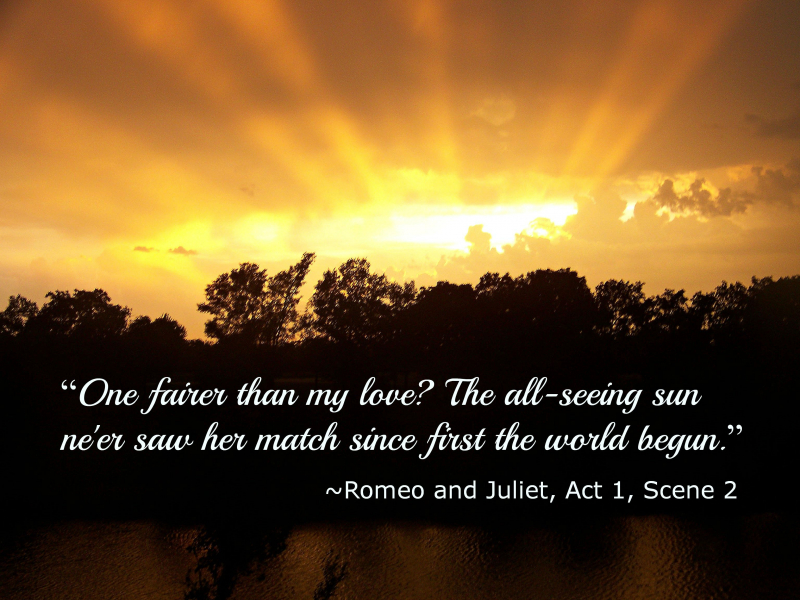
www.pinterest.com -
Romeo is surreptitiously viewing Juliet from a balcony above him in this scene. He extols her tremendous beauty (birds chirping, eyes that would light up heaven, etc.) before remarking on how she is gently stroking her cheek with her hand. His comment: "See how she leans her cheek upon her hand, O that I was a glove upon that hand that I might touch that cheek!" meaning is an indication of his yearning to be a glove, so that he may be the one to touch her cheek (as a glove) (a cheek whose beauty, or "brightness," could shame the stars).
Romeo, like any young lover, is eager to have Juliet to himself. While Romeo just states he wants to touch his lover's cheek in this phrase, we know from earlier moments that he wants to kiss his newfound love on the lips. Romeo was so anxious to be with Juliet that he began kissing her as soon as they met at the Capulets' party! Romeo's impatience and extreme emotional swings, however, are terrible traits that expedite his demise. Juliet, on the other hand, appears to be more in control of her emotions, particularly in this balcony moment. It's almost as if Juliet had to teach Romeo the ways of a "higher love" that goes above simple sexual desires. Despite his evident immaturity, most readers empathize with Romeo's situation.
Romeo - Act 2, Scene 2.
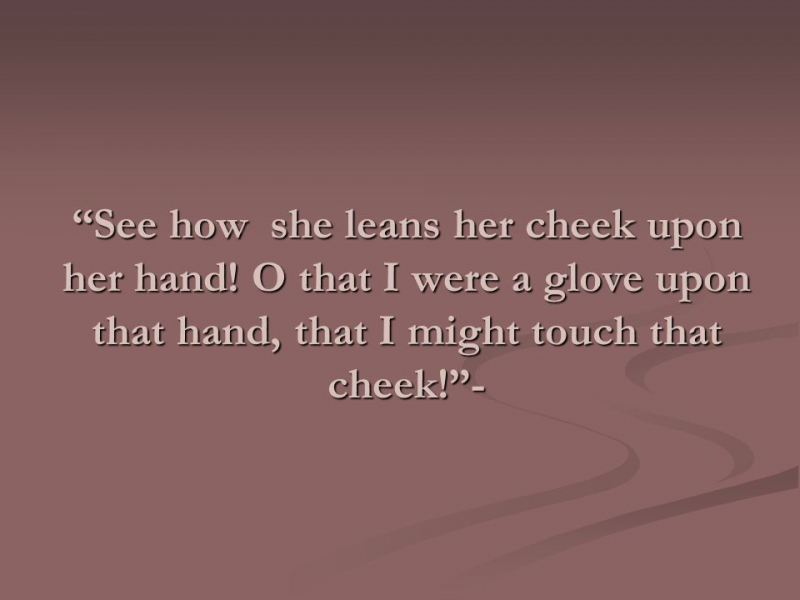
www.pinterest.com shakeoutloud-youtube.com -
Friar Laurence is telling Romeo to consider his decision to marry Juliet carefully and thoughtfully. This demonstrates Friar Laurence's wisdom, as he is aware of what may occur. If their families find out, the marriage will not take place, the couple will be separated and possibly placed under house arrest by their families, and both families would be enraged, escalating the hatred that is already producing street rioting.
Friar Lawrence has given the two star-crossed lovers the brief advice: "Wisely and slow; they stumble that run fast", it became one of the most famous quotations from Romeo And Juliet. Friar Lawrence emphasizes the need for mature knowledge in comparison to impetuous deeds by advising Romeo and Juliet to exhibit prudence and moderation in their love. Although the advice is directed at young lovers, it has universal appeal since it emphasizes the catastrophic repercussions of impulsive judgments made in the heat of desire.
Friar Lawrence - Act 2, Scene 3.

www.pinterest.com 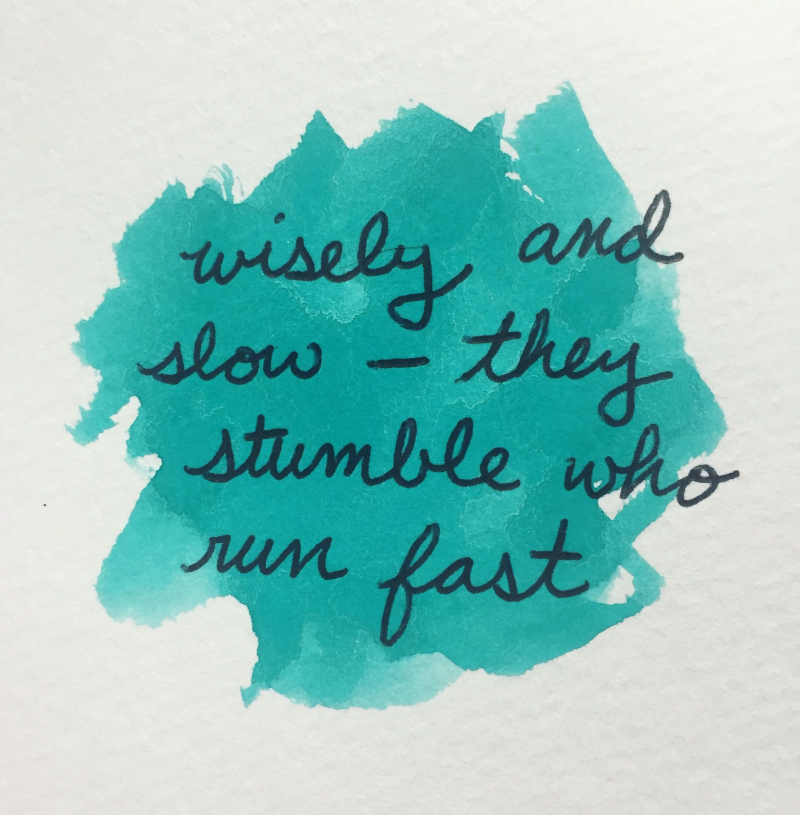
www.pinterest.com









